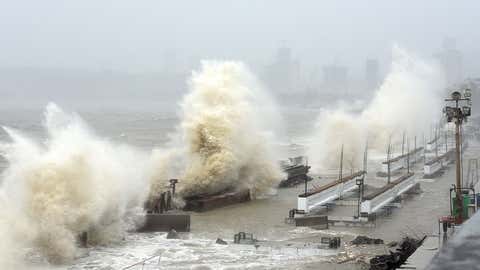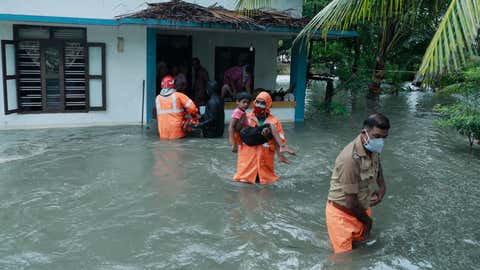
Waves lash a shoreline in Mumbai on May 17, 2021, as Cyclone Tauktae, packing ferocious winds and threatening a destructive storm surge, bears down on India, disrupting the country's response to its devastating COVID-19 outbreak.
(Sujit Jaiswal/AFP via Getty Images)Just as the country was fighting the brutal second wave of COVID-19, another disaster struck India—2021’s first tropical cyclone in the Arabian Sea, named Tauktae. Regarded as one of the strongest cyclonic storms of the 21st century, it battered the country’s west coast, effectively bombarding some of India’s worst impacted COVID-19 states with heavy rains and strong winds.
Running parallel to India’s west coast while heading north-northwestwards in the Arabian Sea, Tauktae made landfall over Gujarat as an Extremely Severe Cyclonic Storm. While on its way, it brought torrential rains accompanied with ferocious, gusty winds in the coastal areas of Kerala, Karnataka, Goa, Maharashtra and finally, Gujarat.
All these states have witnessed a dramatic surge in COVID-19 cases in the second wave, which has been ongoing since April. In spite of a large number of infections and the added threat of the cyclone, however, the authorities of all the states managed to successfully tackle the double whammy situation.
Evacuations and COVID-19 arrangements

Police and rescue personnel evacuate local residents from a flooded house in a coastal area after heavy rains under the influence of Cyclone Tauktae in Kochi on May 14, 2021.
(Arunchandra Bose/AFP via Getty Images)Just ahead of the cyclone, more than two lakh people were safely evacuated from 17 vulnerable districts of Gujarat. Several other patients from the highly impacted districts were also shifted to safer COVID-19 facilities, as one of the top objectives of the authorities was to keep the COVID-19 treatment going.
The chief ministers of the other impacted states also ensured the safety of the COVID-19 patients, while arranging for backup of necessary medical equipment and seamless supply of oxygen in hospitals.
While the Maharashtra government reportedly made arrangements for the backup supply of 12- to 16-hour oxygen in cyclone-vulnerable districts, several power generators were installed in hospitals across Gujarat in case of power outages.
In the Saurashtra region, seven hospitals were prepared as a base at which the patients from Bhavnagar, Amreli, Botad, Junagadh, Gir Somnath, Porbandar, Jamnagar, Devbhoomi Dwarka and Kutch districts could be transferred in time of contingency. Special ambulances equipped with ICU facilities were also arranged for the highly vulnerable areas.
Furthermore, despite the challenges posed by the devastating storm, the express trains continued to deliver the medical oxygen from Gujarat to several other states due to the looming shortage.
On this, CM Rupani said: “Our other concern was that most of the oxygen supplied to other states like Maharashtra, Madhya Pradesh, Rajasthan, Delhi and Haryana may be affected, but nowhere is the delivery being suffered due to the cyclone.”
Meanwhile, Gujarat being highly vulnerable to cyclone-induced destruction has halted the vaccination drives until May 19 due to the raging storm.
Meanwhile, the National Disaster Response Force (NDRF) teams played a major role in carrying out the evacuations, keeping a strict round-the-clock vigil for the past three days to ensure the safe evacuation of people, including COVID-19 patients from the coastal areas. More than 50 NDRF teams were placed on the ground, which covered various vulnerable districts of Gujarat.
The NDRF director-general revealed that all the task force personnel were provided with special suits for the rescue operations, in order to protect them from COVID-19. Moreover, almost all the troopers on the ground were also vaccinated with the double dose of COVID-19 vaccines.
(With inputs from IANS)
**
For weather, science, and COVID-19 updates on the go, download The Weather Channel App (on Android and iOS store). It's free!
"continued" - Google News
May 18, 2021 at 09:04PM
https://ift.tt/3uZQrEF
Cyclone Tauktae: Here's How Storm-Hit States Carried Out Evacuations and Continued COVID-19 Care | The Weather Channel - Articles from The Weather Channel | weather.com - The Weather Channel
"continued" - Google News
https://ift.tt/2WiTaZN
https://ift.tt/2YquBwx
Bagikan Berita Ini














0 Response to "Cyclone Tauktae: Here's How Storm-Hit States Carried Out Evacuations and Continued COVID-19 Care | The Weather Channel - Articles from The Weather Channel | weather.com - The Weather Channel"
Post a Comment